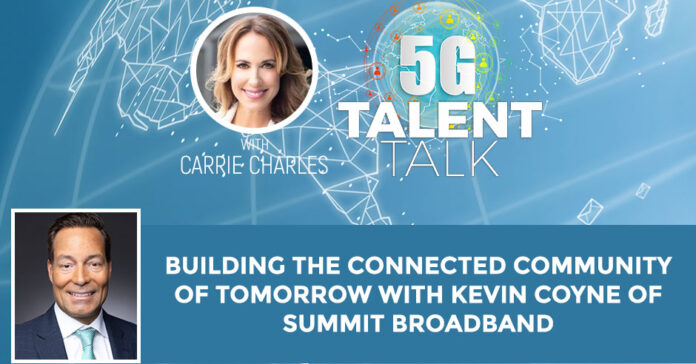Always a crucial aspect of business, the importance of connection was highlighted when the pandemic hit. Our guest this episode, Kevin Coyne of Summit Broadband, strives to be an instrument in building a connected community of tomorrow with Summit Broadband’s products and services. With more than 20 years of telecommunications experience focused on fiber-optic and high-bandwidth solutions, Kevin Coyne leads Summit Broadband to expand its influence and services, in particular to rural communities, to provide better connectivity for all. Listen along as Kevin and Carrie share in-depth insights on focusing on a company’s greatest assets for growth and success.
—
Watch the episode here
Listen to the podcast here
Building the Connected Community of Tomorrow With Kevin Coyne of Summit Broadband
Thank you for joining me. I am excited to have Kevin Coyne with me. He is the CEO of Summit Broadband. Kevin, thanks so much for coming to the show.
Carrie, I appreciate being here. Thank you.
Let’s get started. I want to learn more about your professional career and your journey. I know you’ve done so much. Let’s talk a little bit about what brought you here.
I would be glad to share. It’s interesting because I took such a diverse path when I first started. I wanted to be a pilot. I thought that was my career. I went to school on Daytona Beach. I came full circle. I started in Daytona Beach, and here I am back in Florida with Summit Broadband. I got my pilot’s license and quickly changed and got into Accounting of all things. Who would’ve guessed accounting? I ended up taking the finance track early on and got a Master’s in Tax, and a CPA license. I worked my way into public accounting and met a great individual who was in telecom.
He worked for one of our clients in Annapolis Junction, Maryland, the East Fire Communications. He brought me onboard, which was my first exposure to telecom. It was so overwhelming. I can’t even tell you how overwhelming. As many people know, every acronym is three letters in telecom. I spent a number of years in Maryland with my predecessor, as I said, East Fire, and eventually co-founded Fiberlight.
Our headquarters moved to Atlanta. I spent many years with Fiberlight in various roles, including CFO and COO, and played interim President at one point in time over my career with Fiberlight. That was a great experience. We built that company from scratch to over 17,000 route miles of fiber across various states.
This opportunity opened up with Summit Broadband. I had an opportunity to meet with the new investors that bought Summit Broadband years ago. They were a great partner, which led me to move to Summit Broadband. It’s an exciting role, a little bit of, “Been there, done that,” to some extent. I will share a little bit hopefully on what we do but that’s the journey, and based here in Florida and loving every bit of it.
Welcome to Florida. I’m in Tampa. You are now my neighbor and everyone else in this country.
The timing couldn’t have been better.
We want to build this community of tomorrow that really creates change through connection.
Let’s talk about Summit Broadband. Introduce what you do, who you are, who you serve, and your markets, please. I want to know more.
I would like to start a little bit and what we as a company and the employees view a little bit of our vision here at Summit Broadband. As we got into the assets and the people, I realized this company was an awesome and great base of assets, including the employees. For us, when we think about our vision and what we want to do together, we want to build this community of tomorrow. It creates change through connection. That’s what we are doing. We talk a lot and reference back to an innovator that was here in Florida many years ago, a very futuristic thinker, and that was Walt Disney himself.
We talked about what Walt Disney wanted to create. He also wanted to create this community of tomorrow but in a different manner and different facet. It was very futuristic. He wanted to create an upcut, not the upcut that we know has been developed. Nothing like that but it was a very futuristic community. We think about what we are deploying our products and services here at Summit. It’s establishing futureproof type technologies and architecture throughout the community that can serve all facets of that community.
As we move forward, we want to be able to take that underlying infrastructure, grow with technology and be able to interchange parts and pieces of it while being able to serve all parts of that community. When you think about what we serve and who we serve, we have leading-edge products and services for residential. We tend to stay on the leading edge of those products and services.
We are the first provider to offer XGS-PON. That’s 10-gig symmetrical speeds, download, and upload speeds. We’ve deployed that and executed that leading IPTV product set. We also offer for the commercial space and what we cover in the commercial space we have products and services that address the enterprise and products and services for hospitality.
Governmental, we’ve done a lot of government partnerships and business. Educational, we’ve connected quite a few schools up here in Florida. We connect all facets of that community. When we are bringing our fiber in, it’s being utilized in all parts of the community. That’s how we think about Summit Broadband as we continue to expand our networks across the state of Florida.
I know that bridging the digital divide is something that is dear to your heart and part of that vision for Summit Broadband. Can you talk a little bit about your plan to do that here in Florida and your partnerships with municipalities, and how that plays into it?
COVID shined a huge light on the deficit of our ability to connect in all facets, and bridging that digital divide became a huge initiative across our country. There are a number of programs and initiatives, as many know, that are coming from our Federal Government, but Governor DeSantis also approved another $400 million in addition to the Infrastructure Bill to serve and bridge that digital divide across communities.
A perfect example for us was a heavily competitive RFP process, with the City of Lakeland as an example. We were selected as the provider of choice in the City of Lakeland for a number of reasons. Most importantly, we understood the lack of services as you get more into the rural areas. We also understood that many different types of businesses and parts of the community were impacted.

One of them was the faith-based community. We have a great relationship with the faith-based community. We’ve done a joint partnership with a very entrepreneurial individual in the City of Lakeland who’s connecting up the churches. What they found was during COVID, one of the greatest impacts was on the faith-based community because they were not prepared to have high broadband speeds to be able to distribute their messages to their parish in the community digitally.
That hurt hard the faith-based community. We did partner with them and continued to connect up and what our partnership with this entrepreneur. His name is Pastor Holmes, and he’s delivering a fixed wireless solution where we bring the fiber to him. He deploys a fixed wireless solution and distributes that out either free of charge to his areas within his community or at a very reduced rate but he’s delivering broadband speeds to them. That has been a great partnership for us that we are continuing to expand, not just in Lakeland but in other parts of Florida.
It’s a great success story and so meaningful. You are making a huge difference there. Let’s talk more about fixed wireless as a solution. A lot of the audience may know exactly what it is but there could be some that don’t exist at this point. What is it? Why does it make sense now?
It’s a wireless solution but the fixed piece comes with the fixed radios on the antennas. They are connected ultimately to fiber. We bring in large pipes of bandwidth to these radios. They disperse out and distribute a signal that the residents can utilize and subscribe to. In this example, this individual, Pastor Holmes, offers it either free or depending on the community and their income levels. He is doing it at a very low cost of service.
It’s a much more cost-effective way to reach an area where maybe it’s lower housing density or lower-income and housing density and doesn’t justify building fiber to these residents. It’s a great complimentary service and a way to connect these users to get them the speeds they need and deserve and can afford. We are excited to be able to participate in that solution.
You talked about the connected communities of tomorrow. Can you give more examples about that vision of how Summit Broadband is working to create these connected communities? What would that look like when it’s complete or maybe never complete?
It’s always a work in process because you can’t be completely ubiquitous everywhere. We work great with other partners and service providers to help extend that reach. When we think about connecting the community, it starts with fiber-based solutions because the underlying infrastructure allows us to interchange technologies as they may become obsolete. We know we are moving at a very fast pace with continued advancements in technology.
Fiber is the underlying architecture that allows you to do that. We deploy high counts of fiber. When we talk about connecting the community, it’s being able to serve all facets of that community. When we think about some of these government programs, we are a service provider that’s going to help be one of those service providers to build out the fiber networks. We are going to serve the enterprise, the governments, the educational institutions, etc.
We don’t want to lose sight of deploying that fiber and only single-sourcing it to somebody who’s only going to serve a single user. When the kids leave their homes and go to school, their schools need to be connected. When the parents leave home and go to work, their work needs to be connected. When they are all driving to each location, they need to be connected. We partner with the wireless companies and help them get connected to all the towers through fiber backhaul solutions. That’s another aspect of the connected community.
Put people first.
The last part for us, at Summit, we live and operate here in Florida. We are headquartered here. Our employees live here. We are involved in the community and the associations. We are part of that connection. We understand that. We want to be participants in those communities where we serve our customers. The last piece is the employees being part of that connected community.
You said something earlier and I loved that your people are your greatest assets. I believe that wholeheartedly and know that you do too, Kevin. There are a lot of challenges with hiring, retaining, and engaging. How are you navigating those challenges? What are you facing? Any particular strategies that you are using that are working to find great talent. I know that you need to hire a lot of people to complete your mission here.
It is challenging. We all know that there has been such a labor shortage and challenge around retention. We put some programs in place. I do want to say this because I know a lot of people say, “My employees are my greatest asset,” and that’s true. They should say it because they truly are your greatest asset. One of the core values that we extend, not just to our employees but we ask our employees to extend to our customers, vendors, and creditors, is that we put people first.
It’s important for us to remember that we are all people. We are trying to navigate this crazy thing called life, and things changed. People were different running through problems, whatever but remember to put people first. Our team is thinking about that. They do a good job. I love to watch the work that they’ve done. There is a lot of work that we need to do in our management team to continue to drive a certain culture and a sense of engagement for our employees.
We’ve put in a number of initiatives that we tackle, such as we do an employee pulse survey that they get to give us direct feedback anonymously throughout the year. We put together an employee culture committee that’s represented by all our departments across the company. It gives them an opportunity to provide feedback, ideas, and thoughts around how we can better engage, retain, and make them feel part of what we love to call the Summit Broadband Family.
Everyone that comes onboard, we welcome to the Summit Broadband Family. They are part of our family here. We’ve implemented a number of training programs. We’ve added more resources for them. We continue to do employee recognition programs. We also look at the one thing you always think is an issue. We do compensation studies annually. That’s a big facet of it but we find that it’s not what drives an employee.
The last thing I will tell you is that we have embraced this remote work schedule. We do a hybrid schedule. It’s a little bit unique. We continue to be flexible and fluid in what we do but we know that’s the future. We understand that’s the future. We’ve embraced that fully. We feel like we’ve found a bit of a mix that works now. We will be flexible to change that again tomorrow if we have to.
As you pointed out, we’ve got a hockey curve growth plan, which is in place and moving forward, and we are excited about it. We do have to bring a lot of employees in over the next twelve months and continue to do that. We do that through the partnership we have with you and your RPO program. We are excited because your team has done a phenomenal job in enabling us to find great talent. We appreciate that.
Thank you. It has been so easy to staff for Summit Broadband. Everything you said, Kevin, is absolutely 100% true that you put people first, and it is a family. In fact, I’m going to adopt this at Broadstaff. I love what you said you put together an employee culture committee. It represents each division, and what a great idea. That’s fantastic.

We allow them to develop their own agenda. We gave them some baseline, views, and thoughts but they are often running on their own. They are coming up with some great ideas. I shared some of them that they had come up with, and we will continue to implement them as we move forward. The last thing I will say about the employee and the culture is we go to an extreme in adhering to a few basic principles for our employees. One of them is transparency. We want to be so transparent in what we are doing because, 1) It makes them feel part of the team and, 2) It enables them to be decision-makers in everything they do. They know which direction we are heading and which direction we are growing.
We know that the more they know, the more they can make good decisions on our behalf to move the company forward. There are a couple of other pieces we talk about within our management team, which is being very clear. A lot of clarity around when we bring a new person in, “What is your role? What are the expectations of your role?” Those expectations are delineated right out of the gate. We make sure that our managers are accountable for continuing to meet those expectations.
They came onboard expecting X, Y, and Z. We got to do our part and make sure we meet those expectations. Finally, the last piece that we talk about internally too is accountability. We don’t want other employees to say, “You are not holding everyone accountable for what you are holding me accountable for.” We want fairness across the board. Those are a handful of key principles that we’ve adopted internally to make sure that our employees understand their roles and their expectations that they’re all treated equally as we move forward.
One thing that you do well there at Summit Broadband and under your leadership, Kevin, is that leadership development. We find working with your leaders that there’s alignment. You have some strong leadership that is dedicated to the principles that you mentioned, which it can be difficult to make sure that’s all the way down the line. There’s consistency. I want to ask you because, from my point of view, you are one of the most incredible leaders in our industry. I want you to tell me what has made you a successful leader. What are your core principles, “I will never stray from this, and this is what I believe in?”
One of them I shared with you. Over the years, you learn from others that you work with. I always relate it to my brothers. I’ve got 3 brothers, 2 of them were older. I always knew what not to do with my parents when they got in trouble. I’m like, “I’m not going to do that because I know that’s going to get me into trouble.” It’s similar to others that have mentored and led me over the years. I’m going to go back to this transparency concept. It was one of my most important skills, traits or principles that I wanted to adhere to the nth degree.
When I first came onboard with Summit, the first all-staff call, we were so transparent that the existing team in place was like, “You can’t share all this.” I’m like, “Help me understand why. I don’t quite grasp that.” Everybody started to embrace that. That’s one. The second important thing is empathy. I started to touch on this before empathizing with people. People are good people. I always say, “They are great people until they prove you otherwise because you will get a bad example from time to time.”
Because somebody is having a bad day doesn’t mean they are a bad person, and everybody has personal lives, and empathizing with that because you don’t know what’s going on in their personal lives. You got to give them a pass and understand them. Some open up, some may not but you got to retain a good sense of empathy with your employee base.
They will run through walls for you if they know you are there for them. Those are probably the two biggest things for me as we move the company forward. You can put all the goals and objectives on the walls and push. If they don’t think you are there for them, with them, it’s pretty thick and thin. None of it is going to matter.
You are speaking the language of this workforce. I applaud you for that. How do you develop leaders in your company whether it’s a new leader or a leader that has enormous experience? Do you have any formal development? How do you handle that?
People are good people until they prove you otherwise.
We don’t necessarily have formal development but we are working towards that. There has been a lot of work that we had to get through in my first couple of years here at Summit Broadband. Those are critical aspects of building a strong company. We do want to grow and be the leading provider here in the State of Florida. We are on that track.
We expect to get there. That’s going to be critical. We want to build and continue to promote from within and provide the right training. One of the other favorite sayings I love for the team that I work with here is that we could try to do it all ourselves, but it’s not scalable. Therefore, you have to rely on your teams to make decisions on your behalf.
Allowing them to be more autonomous will help them be better leaders, spot check, guide, and coach along the way. We have a significant training program. We invested in some trainers internally. We’ve got another great partnership and a PEO Insperity. I’m not trying to plug them for any reason other than I could probably sell for them. They’re a great platform. They’ve got a significant training platform that we can leverage for training classes and so forth.
We do a lot of communication internally. We are consistently doing all calls and senior leadership team calls, and it’s very thorough. Our view is that they are hopefully learning from what we are doing and how we are operating. We try to lead by example. We like to call ourselves working executives. We roll our sleeves up. We are in the weeds with everybody else. There does need to be a formal training program over time to help continue to develop because they won’t pick it all up on their own. That’s something that will have to be in the works for us.
Kevin, where will Summit Broadband be in five years? What lights you up about the future?
We continue to look at great opportunities, and it’s all about edging out and getting that fiber throughout. I will use the word ubiquitous. I would love to be ubiquitous across the state. I should tell you that the team wants to be that leading provider across the State of Florida. We’ve developed the relationships and the partnerships. There’s a lot of good work that’s going that could put us across the entire state. When you think about our footprint and our networks, we moved quickly.
When I came on board, it was Orlando and Naples. We’ve edged out around Orlando. We got a pretty dense footprint there. We’ve worked our way West to Winter Haven, the City of Lakeland, Tampa, St. Pete, and Clearwater. Now, we are starting to edge down. We are working on some opportunities within Manatee and Sarasota. We have a significant footprint in all of Lee County and Collier County. You think about City Cape Coral, Fort Myers, and Naples. We are building throughout Marco Island.
We are moving quickly but for Summit Broadband, we want to connect up those in communities and bridge the digital divide. When we think about connecting communities, it’s not those central business districts. It’s out in the rural markets. There are some things in the works that could put that into play fairly quickly, may not be five years. It could be two years. We are excited about what’s in the works.
I can’t wait. We may have to do another episode and check in on everything. Kevin, I am sure that people are reading that say, “I want to be part of the Summit Broadband family.” Where can we find out more about summit broadband and the jobs available now?

We are on a big hiring spree. If you go to our website, Summit Broadband, at the bottom, you will see a Careers page. On there, it lists every job, and you can apply right online. We’ve got about 30 open positions. We are moving quickly and continue to feel quickly. We’ve already added 2021 about 70 positions. We are on pace to add another 70 between now and the end of 2022.
Kevin, this has been wonderful. I appreciate you coming to the show. I’ve learned a lot from you and have a great deal of respect for you, all that you’ve done, and all that you are doing. Thanks for coming to the show.
It has been great. We enjoy our partnership. Thank you for all you do for us. Thanks for having me on the show.
Thank you, Kevin. You take care. We will see you soon.
Thank you.
Important Links
About Kevin Coyne
 Kevin Coyne joined Summit Broadband in May 2020. With more than 20 years of telecommunications experience focused on fiber-optic and high-bandwidth solutions, Mr. Coyne leads the company as it continues the strategic expansion of its fiber-optic network into new enterprise, government, education, and residential communities in Florida.
Kevin Coyne joined Summit Broadband in May 2020. With more than 20 years of telecommunications experience focused on fiber-optic and high-bandwidth solutions, Mr. Coyne leads the company as it continues the strategic expansion of its fiber-optic network into new enterprise, government, education, and residential communities in Florida.
Before joining Summit Broadband, Mr. Coyne was a founding member and Chief Operating Officer of FiberLight, LLC, where he led all aspects of sales, operations, and finance. In that role, he grew FiberLight from a company with less than $1 million in revenue and 1,100 route miles of network to one with more than $200 million in revenue and 16,000 route miles, spanning over 430 cities and including over 1.8 million fiber miles. His background includes roles in finance, strategic planning, sales, marketing, and operations. Mr. Coyne is a Certified Public Accountant and holds an Accounting degree from Towson State University and a Master of Science degree in Taxation from the University of Baltimore.
Love the show? Subscribe, rate, review, and share!
Join the 5G Talent Talk Community today:

